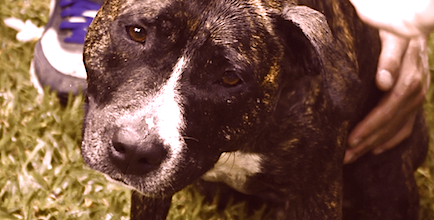Why Is My Dog Coughing? 8 Common Causes and How to Help
The most common causes of coughing in a dog include kennel cough, chronic bronchitis and collapsing trachea.
This pet health content was written by a veterinarian, Dr. Debora Lichtenberg, VMD. It was originally published in 2016 and is regularly updated. It was last reviewed for accuracy by Dr. Pippa Elliott, BVMS, MRCVS, and updated on September 5, 2024
If you have questions or concerns, call your vet, who is best equipped to ensure the health and well-being of your pet. This article is for informational purposes only and is not a substitute for professional medical advice, diagnosis, or treatment. See additional information.

- Recognizing Kennel Cough in Dogs
- Possible Causes of Coughing in a Dog
- Kennel Cough: A Common Cause of Coughing in Dogs
- Chronic Bronchitis in Dogs: A Persistent Coughing Concern
- Collapsing Trachea: A Cause of Dry, Hacking Cough in Dogs
- Heart-Related Coughing in Dogs: A Sign of Heart Failure
- Pneumonia in Dogs: A Serious Condition Requiring Immediate Care
- Cancer in Dogs: Lung Cancer and Metastasis
- Fungal Pneumonia: A Serious Cause of Coughing in Dogs
- Heartworm Disease: A Dangerous Cause of Coughing in Dogs

Don’t leave your pet’s safety to chance
Sign up for Petful recall alerts today.

Recognizing Kennel Cough in Dogs
Mr. Businessman stood in front of me, trying to wretch, while his dog sat quietly at his feet, seemingly unaware of the commotion. The man tried to imitate his dog’s strange coughing sounds, a mix of gagging and strangulation.
Clients often try to reproduce their dog’s cough, but why is my dog coughing is a common concern, especially when the sound is as unsettling as that caused by kennel cough.
- Kennel cough, one of the most common causes of coughing in healthy dogs, is a mix between a cough, a gag, and a deep, ungodly sound.
- Most coughs are triggered by irritation or infection in the respiratory tract.
- Factors like age, breed, and lifestyle, combined with a veterinary exam, help narrow down the cause.
For more details about kennel cough, you can visit AVMA’s page on Canine Respiratory Coronavirus.
Possible Causes of Coughing in a Dog
Kennel Cough: A Common Cause of Coughing in Dogs
One of the most frequent answers to the question why is my dog coughing is kennel cough. Despite its name, kennel cough (infectious tracheobronchitis) is highly contagious and can spread quickly, even to dogs who haven’t left their immediate neighborhood.
- Many owners mistakenly think their dog has something stuck in its throat, but kennel cough often causes a severely irritated throat.
- While dogs with something lodged in their airway are in serious distress, dogs with kennel cough have an annoying, persistent cough that isn’t life-threatening.
- Kennel cough typically improves over time, with medications if needed. To avoid spreading the condition, keep infected dogs away from other dogs.
For more information, visit VCA’s page on Kennel Cough and Tracheobronchitis in Dogs.
Chronic Bronchitis in Dogs: A Persistent Coughing Concern
Unlike kennel cough, chronic bronchitis in dogs can be more difficult to diagnose and does not improve over time with standard medications. Initially, chronic bronchitis may be mistaken for kennel cough, but a key difference is that dogs with chronic bronchitis continue to cough beyond the typical recovery period for kennel cough, which is usually 1–3 weeks.
- Chronic bronchitis is often thought to be immune-mediated or allergic in nature.
- Treatment typically includes steroids like prednisone to suppress inflammation in the airways and reduce coughing.
- Other treatment options may include inhalers, bronchodilators, doxycycline, cough suppressants, and reducing exposure to smoke and aerosols.
For more information, check out Merck Vet Manual’s guide on Chronic Bronchitis and learn more about allergic reactions in dogs. You can also explore how people suffering from asthma and allergies may benefit from certain dog breeds here.
Additionally, read about bronchodilators for respiratory issues in dogs.
Collapsing Trachea: A Cause of Dry, Hacking Cough in Dogs
A collapsing trachea occurs when the trachea, or windpipe, weakens and collapses as air is drawn into the body, leading to a dry, hacking cough. This condition is more common in small breed dogs like Poodles, Chihuahuas, and Pomeranians.
- Heat, exercise, and obesity can worsen the symptoms of a collapsing trachea.
- Dogs mildly affected by the condition will have an intermittent dry cough.
- In severe cases, dogs may experience difficulty breathing, requiring immediate attention.
Treatment focuses on controlling the symptoms rather than curing the condition, helping to reduce the dog’s discomfort over time.
In this video, Dr. Greg Martinez, DVM, discusses more about collapsed trachea treatment:
Heart-Related Coughing in Dogs: A Sign of Heart Failure
A cough can sometimes be a sign of chronic heart failure in dogs, often due to the development of pulmonary edema (fluid buildup in the lungs). By the time a dog starts coughing from heart failure, they may also experience:
- Shortness of breath
- Labored breathing
- Increased difficulty with physical activities
Heart medications and diuretics can help manage the symptoms and reduce the coughing, but the prognosis for dogs with heart failure remains guarded.
It’s also important to note that some dogs, especially small breeds, can suffer from multiple cough-producing conditions simultaneously. For instance, a small dog like a Poodle may have a combination of a heart murmur, chronic bronchitis, and a collapsing trachea, complicating the diagnosis and treatment.
Pneumonia in Dogs: A Serious Condition Requiring Immediate Care
Dogs suffering from pneumonia are typically very ill, although true pneumonia is uncommon. Older dogs, sick puppies, or immunocompromised canines are the most susceptible to this condition. Treatment for pneumonia often includes:
- Aggressive care
- Hospitalization
- IV antibiotics
Due to the severity of pneumonia, immediate veterinary intervention is crucial.
Cancer in Dogs: Lung Cancer and Metastasis
Coughing can also be a symptom of lung cancer in dogs. The severity of the cough depends on the type and extent of the disease. In most cases, lung cancer is metastatic, meaning the cancer originated in another part of the body and spread to the lungs. Sadly, lung cancer in dogs carries a poor prognosis.
For more information, visit Petful’s article on Dog Cancer.
Fungal Pneumonia: A Serious Cause of Coughing in Dogs
Fungal pneumonia occurs when a dog contracts a fungal infection, typically found in specific geographic regions. This type of pneumonia is serious and requires aggressive treatment to manage. Veterinary care often involves:
- Anti-fungal medications
- Hospitalization in severe cases
- Regular monitoring to track the dog’s response to treatment
Fungal pneumonia must be treated promptly to prevent complications and ensure the best possible outcome.
Heartworm Disease: A Dangerous Cause of Coughing in Dogs
Coughing can also be a sign of heartworm disease in dogs. By the time coughing occurs, the dog may already be in heart failure due to damage caused by the heartworms. A detailed medical history can help in diagnosing this condition, but even with treatment, the prognosis remains guarded. However, treatment should always be attempted to manage the symptoms and improve the dog’s quality of life.
- Heartworm disease leads to serious damage to the heart and lungs.
- Immediate veterinary care is necessary to manage this condition.
For more details, visit Petful’s guide on the warning signs of heartworm disease.
Take-home advice: Don’t let a cough persist for too long before getting it checked by a veterinarian. The majority of coughing conditions can be treated, and early intervention can make all the difference. As anyone who’s had a persistent cough knows, the longer you go without relief, the worse it gets.
Frequently Asked Questions (FAQ)
Why is my dog coughing?
Dogs may cough due to irritants, infections, or conditions like kennel cough, bronchitis, or heart disease.
Why is my dog coughing like something is stuck in his throat?
This type of cough is often caused by kennel cough, which irritates the throat and airway, mimicking the sensation of something being stuck.








